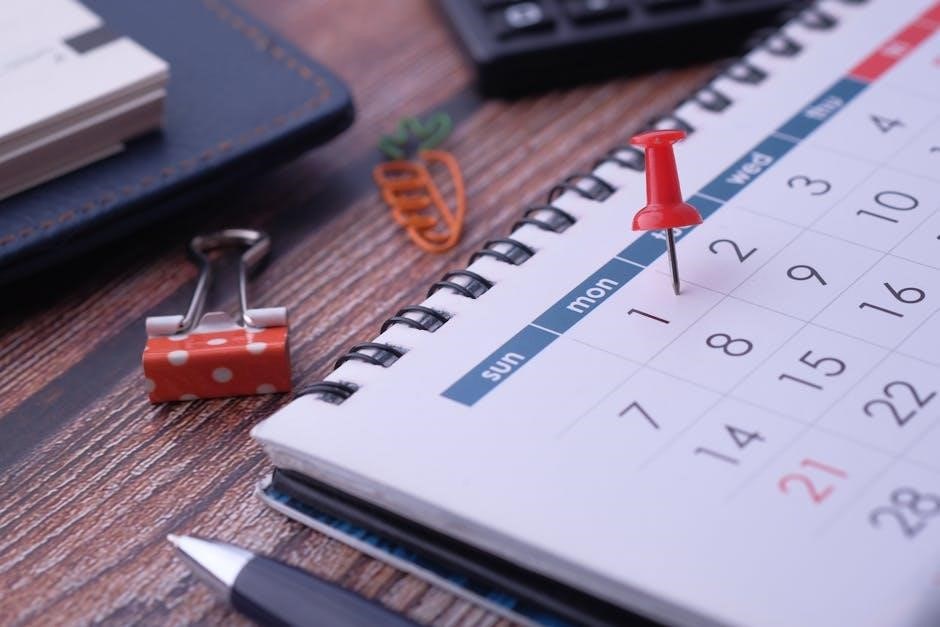An 8-week-old puppy schedule is crucial for balancing feeding, potty training, playtime, and sleep. Consistency helps puppies thrive during this critical growth phase, ensuring proper development and routine.
Why an 8-Week-Old Puppy Schedule is Important
A schedule helps puppies develop routines for feeding, potty training, and play, fostering consistency and structure. It ensures proper growth, prevents overexertion, and addresses behavioral issues early. A well-planned schedule also aids in housebreaking, socialization, and training, creating a sense of security for the puppy. Consistency helps puppies thrive, making it easier for owners to manage their daily needs and ensure a healthy, well-adjusted dog.
Key Components of a Puppy Schedule at 8 Weeks
A well-structured puppy schedule at 8 weeks includes feeding times, potty breaks, playtime, sleep, and training sessions. Consistency in feeding ensures proper nutrition and digestion, while regular potty breaks help with housebreaking. Playtime aids in socialization and physical development, while sufficient sleep supports growth. Training sessions introduce basic commands and Crate training helps with behavior management. A balanced routine prevents overexertion and provides a sense of security, fostering healthy development and preparing the puppy for future challenges.
Feeding Schedule for an 8-Week-Old Puppy
A balanced feeding schedule for an 8-week-old puppy involves 3-4 meals daily, using high-quality puppy food. Consistency aids digestion and supports growth, while portion control prevents obesity. Always provide fresh water and consider crate feeding for a calm dining experience. Adjust portions based on breed and weight, consulting a vet for precise guidelines. Monitor eating habits and stool quality to ensure optimal nutrition and health.
How Often Should an 8-Week-Old Puppy Eat?
An 8-week-old puppy should eat 3-4 small meals daily. Puppies at this age have high energy needs and small stomachs, requiring frequent feeding to avoid hypoglycemia. Divide their daily ration into equal portions to maintain stable blood sugar levels. Feeding every 3-4 hours during the day ensures proper nutrition and supports growth. Consistency in meal times helps with digestion and potty training. As the puppy grows, gradually reduce the number of meals, but always consult a vet for personalized advice to meet their specific needs and breed requirements.
Best Foods for an 8-Week-Old Puppy
The best foods for an 8-week-old puppy are high-quality, nutrient-rich puppy foods formulated for their life stage. Opt for puppy-specific kibble or wet food with essential proteins, fats, and vitamins. Choose brands with whole ingredients and avoid fillers. Large-breed puppies may need specialized diets to prevent growth issues. Always consult your vet to ensure the food meets your puppy’s specific needs. Avoid table scraps, onions, or chocolate, as these can harm your puppy. A balanced, age-appropriate diet supports healthy growth and development.
Portion Sizes and Feeding Guidelines
For an 8-week-old puppy, portion sizes depend on their breed, weight, and activity level. Typically, puppies need 3-4% of their body weight in food daily, divided into 3-4 meals. For example, a 10-pound puppy should eat about ⅓ to ½ cup per meal. Use a high-quality puppy food and follow the feeding chart on the label. Avoid overfeeding to prevent obesity. Offer fresh water at all times. Adjust portions as your puppy grows, and consult your vet for personalized feeding recommendations to ensure optimal growth and health.
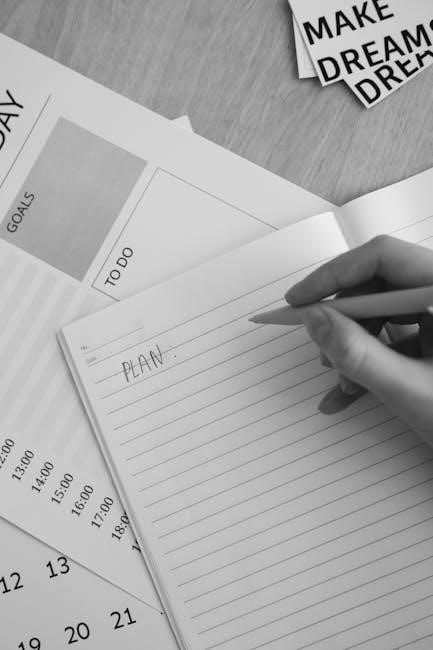
Potty Training an 8-Week-Old Puppy
Establishing a consistent routine is key for potty training an 8-week-old puppy. Take them outside after meals, naps, and playtime. Use a crate to prevent accidents and reward successful efforts with praise and treats. Keep an eye on signs they need to go, like sniffing or circling, and be patient as they learn.
How Often Should You Take an 8-Week-Old Puppy Outside?
An 8-week-old puppy needs frequent trips outside, ideally every 1-2 hours, or after meals, playtime, and naps. Puppies at this age have small bladders and limited control. Take them to the same spot each time to create a routine. Immediately after waking up, eating, or playing, guide them outside. Consistency helps prevent accidents and speeds up potty training. Watch for signs like sniffing or circling, indicating they need to go. As they grow, you can gradually increase the time between outings.
Common Challenges in Potty Training at 8 Weeks
Potty training an 8-week-old puppy can be challenging due to their small bladder size and limited control. Accidents are common, especially in the early stages. Puppies may not yet recognize the need to signal they need to go outside. Weather conditions, such as rain or cold, can also discourage them from eliminating outdoors. Additionally, distractions like excitement or curiosity can interfere with the training process. Consistency and patience are key to overcoming these challenges and establishing a successful routine.
Using a Crate for Potty Training Success
A crate is an effective tool for potty training, as it helps puppies learn to hold their bladder and bowels. Puppies naturally avoid soiling their sleeping space, making the crate a useful aid. Choose a crate that allows your puppy to stand, turn, and lie down comfortably. Place it in a quiet area and introduce it gradually, starting with short periods. Add comfortable bedding to make it inviting. Avoid using the crate as punishment to ensure a positive association with the space.
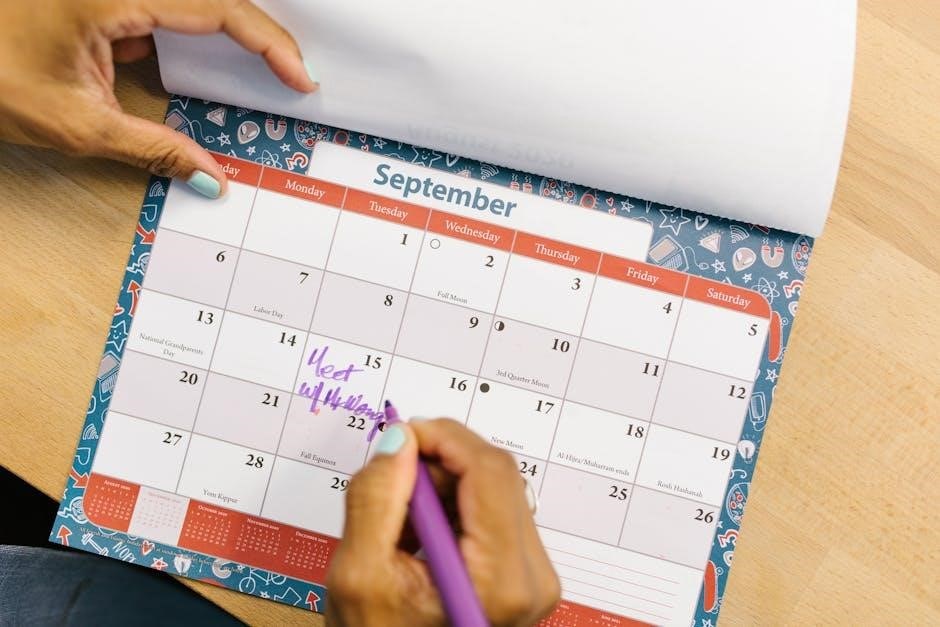
Playtime and Socialization
Playtime and socialization are crucial at 8 weeks. Introduce new environments, people, and pets to aid social skills. Positive interactions build confidence and curiosity, essential for development.
How Much Playtime Does an 8-Week-Old Puppy Need?
An 8-week-old puppy needs short, frequent play sessions of 10-15 minutes, 3-4 times daily. Puppies tire easily, so keep activities gentle, like toy play or soft wrestling. Avoid overexertion by watching for signs of fatigue, such as panting or slowing down. Playtime aids physical and mental development, helping build strength and coordination. Always end sessions while the puppy still wants to play to keep them positive and engaging.
Safe Activities for an 8-Week-Old Puppy
At 8 weeks old, puppies need gentle, engaging activities that promote growth without overexertion. Safe options include short walks in safe areas, playtime with soft toys, and interactive games like hide-and-seek. Avoid rough play or high-impact exercises. Supervised exploration of puppy-proofed rooms and introductory scent games are also great. Always ensure activities are short and supervised to prevent accidents or exhaustion. These experiences help build confidence and curiosity while keeping your puppy safe and entertained.
Introducing Other Pets and Family Members
Introducing an 8-week-old puppy to other pets and family members requires patience and care. Start with gradual, controlled introductions in neutral areas to prevent territorial behavior. Keep the puppy calm by using positive reinforcement, such as treats and gentle praise. Supervise interactions closely to ensure safety and monitor the puppy’s reactions. Avoid overwhelming the puppy with too many new faces or animals at once. This approach helps build confidence and fosters positive relationships within the household.

Sleep and Rest for an 8-Week-Old Puppy
An 8-week-old puppy needs 18-20 hours of sleep daily, including naps and overnight rest. Ensure a quiet, comfortable space for undisturbed sleep to support growth and development.
How Many Hours of Sleep Does an 8-Week-Old Puppy Need?
An 8-week-old puppy typically needs 18-20 hours of sleep daily, spread across nighttime rest and daytime naps. Puppies this age sleep a lot to support rapid growth and development. Most puppies sleep 12-14 hours at night and 4-6 hours during the day. Ensuring adequate sleep is crucial for their physical and mental health. A consistent sleep schedule helps regulate their energy levels and supports overall well-being. Providing a quiet, comfortable space for rest is essential to meet their sleep needs effectively.
Creating a Safe Sleep Environment
Creating a safe sleep environment for your 8-week-old puppy is essential for their well-being. Provide a comfortable, draft-free space with a soft bed or crate. Ensure the area is quiet and free from hazards like electrical cords or fragile items. Keep the room at a comfortable temperature (around 70-75°F) to promote relaxation. Supervise your puppy during sleep to prevent accidents and ensure their safety. A secure environment helps your puppy feel protected, fostering better sleep quality and overall health.
Signs of Overexertion in Puppies
Recognizing signs of overexertion in an 8-week-old puppy is crucial for their health. Look for excessive panting, limping, or lethargy, as these indicate they may be tired or in discomfort. Drooling, trembling, or loss of interest in activities can also signal overexertion. If your puppy shows these signs, stop playtime and allow them to rest. Ensuring adequate rest periods helps prevent fatigue and supports their growth. Always monitor their behavior and adjust activities to suit their energy levels for optimal well-being.
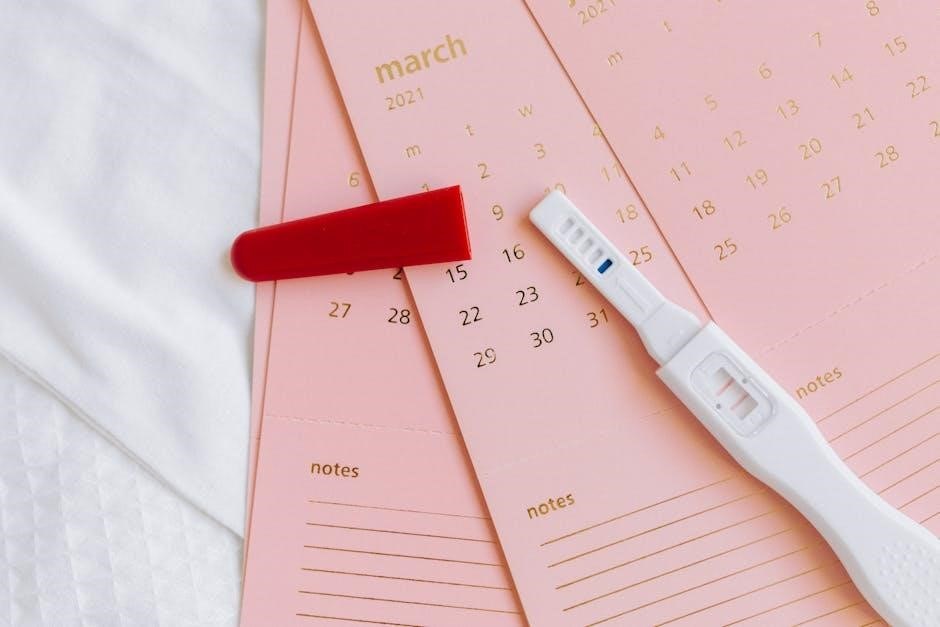
Veterinary Care and Health Checks
Regular veterinary care is essential for an 8-week-old puppy’s health. Schedule check-ups, vaccinations, and parasite control to ensure a strong foundation for growth and development.
First Vet Visit for an 8-Week-Old Puppy
The first vet visit for an 8-week-old puppy is crucial for ensuring health and detecting potential issues early. The vet will perform a physical exam, check for parasites, and administer initial vaccinations. This visit also provides an opportunity to discuss feeding, potty training, and overall care. It’s a key step in building a lifelong health plan and addressing any concerns, ensuring your puppy starts life on the right track.
Vaccination Schedule for Puppies
The vaccination schedule for puppies typically begins at 6-8 weeks with core vaccines like distemper, hepatitis, and parvovirus (DHPP). A second round is given 3-4 weeks later, with a final booster at 16-17 weeks. Non-core vaccines, such as Bordetella, may be added based on lifestyle. Following this schedule ensures your puppy builds immunity against dangerous diseases. Consult your vet to tailor the schedule to your puppy’s specific needs and environment.
Monitoring Health at 8 Weeks
Monitoring your puppy’s health at 8 weeks involves checking for signs of illness, such as vomiting, diarrhea, or lethargy. Ensure they are gaining weight steadily and have a shiny coat. Keep an eye on hydration levels and watch for parasites like fleas or ticks. Regularly inspect their ears, eyes, and paws for infections. A daily health check helps catch issues early, ensuring your puppy stays thriving and healthy during this critical growth phase.
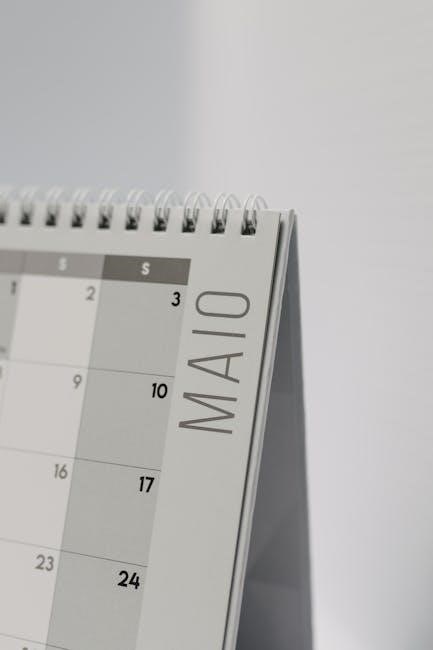
Training Sessions
Training sessions at 8 weeks focus on introducing basic commands, socialization, and positive reinforcement. Keep sessions short to maintain engagement and avoid overwhelming the puppy.
Starting Basic Commands at 8 Weeks
At 8 weeks, puppies can begin learning simple commands like “sit,” “stay,” “come,” and “leave it.” Use positive reinforcement with treats and praise to encourage good behavior. Keep sessions short (5-10 minutes) to maintain focus. Introduce one command at a time, repeating exercises until the puppy understands. Consistency is key to building a strong foundation for future training. Start with clear, firm commands and avoid overwhelming the puppy with too much information at once.
How Long Should Training Sessions Be?
Training sessions for an 8-week-old puppy should be short and engaging, lasting 5-10 minutes. Puppies at this age have limited attention spans and can easily become overwhelmed. Keep sessions fun and positive, ending while the puppy is still focused. If the puppy loses interest or shows signs of fatigue, it’s time to stop. Consistency is more important than duration, so aim for 2-3 short sessions daily. This approach helps build a strong foundation for future learning and prevents frustration for both you and your puppy.
Positive Reinforcement Techniques
Positive reinforcement is a highly effective training method for 8-week-old puppies. Reward desired behaviors with treats, praise, or affection to encourage repetition. Use high-value rewards during early training to capture your puppy’s attention. Consistency is key, so ensure all family members use the same commands and rewards. Timing is crucial—reward immediately after the desired action to help your puppy make the connection. Over time, phase out treats and replace with praise for sustained good behavior. This method builds trust and fosters a joyful learning environment.
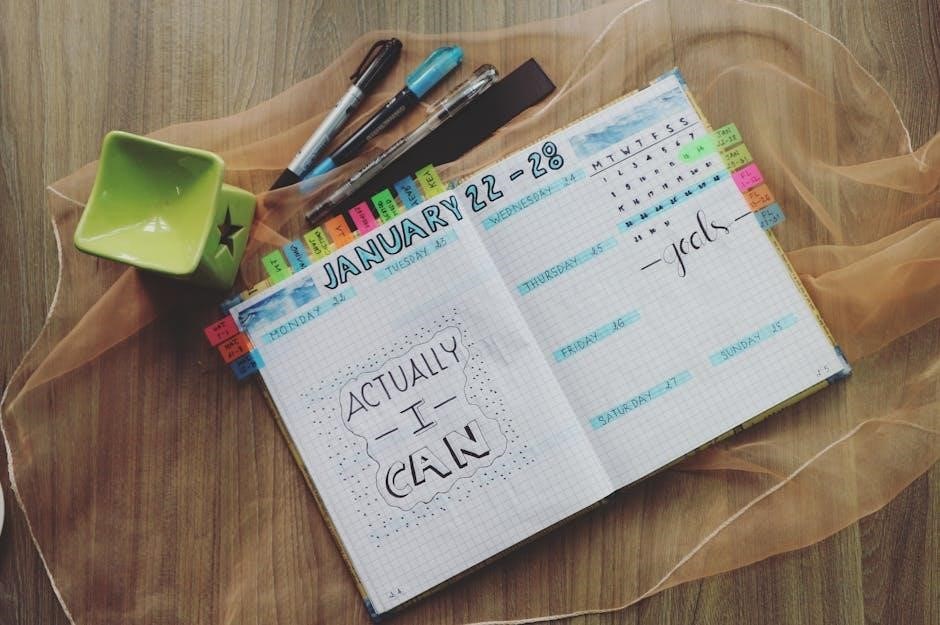
Introducing Crate Training
Crate training helps with potty training, reduces separation anxiety, and prevents destructive behavior. It provides a safe, controlled space for your puppy to relax and learn boundaries.
Benefits of Crate Training at 8 Weeks
Crate training at 8 weeks offers numerous benefits, including aiding in potty training by creating a controlled environment. It helps reduce separation anxiety and prevents destructive behavior when unsupervised. The crate provides a safe space for your puppy to relax, promoting better sleep and reducing stress. It also helps with teaching boundaries and can prevent accidents in the house. Crate training is a valuable tool for establishing routine and ensuring your puppy’s safety and well-being during early development.
How to Introduce a Crate to a Puppy
Introducing a crate to an 8-week-old puppy should be done gently and gradually. Start by placing the crate in a common area with the door open and a comfortable bed inside. Encourage the puppy to explore by offering treats or toys. Once the puppy is comfortable entering, begin closing the door during feeding or playtime, then gradually increase the duration. Always reward calm behavior to build trust and avoid negative associations with the crate.
Crate Training Dos and Don’ts
When crate training an 8-week-old puppy, establish a consistent routine and use the crate for short periods. Keep the crate in a social area and make it a positive space with toys. Avoid leaving the puppy in the crate for too long, as it can lead to frustration. Never use the crate as a punishment or leave the puppy unattended for extended periods. Monitor for signs of distress and gradually increase crate time as the puppy grows accustomed to it.

Daily Walks and Exercise
Daily walks and exercise are crucial for an 8-week-old puppy’s development. Start with short 5-10 minute walks, gradually increasing as the puppy grows. Playtime should match their energy levels, focusing on fun and exploration. Adapt activities to their age and ability, ensuring rest periods are included to prevent overexertion.
How Often Should You Walk an 8-Week-Old Puppy?
An 8-week-old puppy should be walked 3-4 times a day, with each session lasting about 5-10 minutes. This frequency supports their physical development and potty training. Walks should be short and gentle to prevent overexertion. The puppy’s breed and size can influence the exact duration, but consistency is key. Always monitor the puppy’s behavior for signs of fatigue, such as lagging or panting heavily, and adjust the routine accordingly. Consult a veterinarian for personalized advice tailored to your puppy’s needs.
Exercise Needs of an 8-Week-Old Puppy
An 8-week-old puppy needs light exercise to promote growth without strain. Short walks, playtime in small areas, and interactive toys are ideal. Overexertion can harm developing joints, so activities should be gentle and brief. Playtime indoors or in safe outdoor spaces helps burn energy and aids in socialization. Mental stimulation through puzzle toys also supports cognitive development. Ensure exercise sessions are balanced with ample rest periods to prevent fatigue and injury, keeping the puppy’s overall well-being as the top priority.
Signs of Fatigue in Puppies
Recognizing signs of fatigue in an 8-week-old puppy is crucial to avoid overexertion. Common indicators include slowing down, lying down, or resisting activity. Puppies may pant heavily, show lack of interest in play, or appear lethargic. Their tails may drop, and they might avoid eye contact. If a puppy stops responding to stimuli or seems disinterested in their surroundings, it’s time to rest. Overexertion can lead to stress or health issues, so always prioritize their energy levels and provide ample breaks.

Monitoring Development
Monitoring development at 8 weeks involves tracking physical growth, like weight and teeth, and behavioral milestones, such as coordination and social skills. Regular vet check-ups ensure healthy progress and allow adjustments to the puppy’s schedule as needed for optimal development.
Physical Development at 8 Weeks
At 8 weeks, puppies show significant physical growth. Their baby teeth start erupting, and motor skills improve, allowing them to run and play more effectively. Their weight typically doubles since birth, and their coordination becomes more refined. Eyes and ears are fully open, enhancing their ability to interact with the environment. Monitoring these physical milestones helps ensure proper growth and development, while also guiding adjustments to feeding, exercise, and play schedules to support their health.
Behavioral Development at 8 Weeks
At 8 weeks, puppies begin showing curiosity and playfulness, exploring their environment actively. Socialization is critical, as they start forming bonds with humans and other animals. Fear and confidence behaviors may emerge, shaping their personality. Positive interactions during this period help build a well-adjusted adult dog. Consistent routines and gentle guidance support emotional growth, fostering trust and reducing anxiety. This stage lays the groundwork for future behavior, making it a key time for positive reinforcement and habit formation.
Adjusting the Schedule as the Puppy Grows
As your puppy grows, their needs evolve, requiring adjustments to their schedule. Feeding times may change from 3-4 meals to twice daily. Potty breaks and play sessions can be spaced out as bladder control improves. Exercise intensity and duration increase gradually. Monitor growth spurts and energy levels to modify activities. Flexibility is key to accommodate developing needs and ensure a smooth transition into adulthood. Tailor the schedule to your puppy’s unique pace, ensuring it remains balanced and supportive of their overall development.
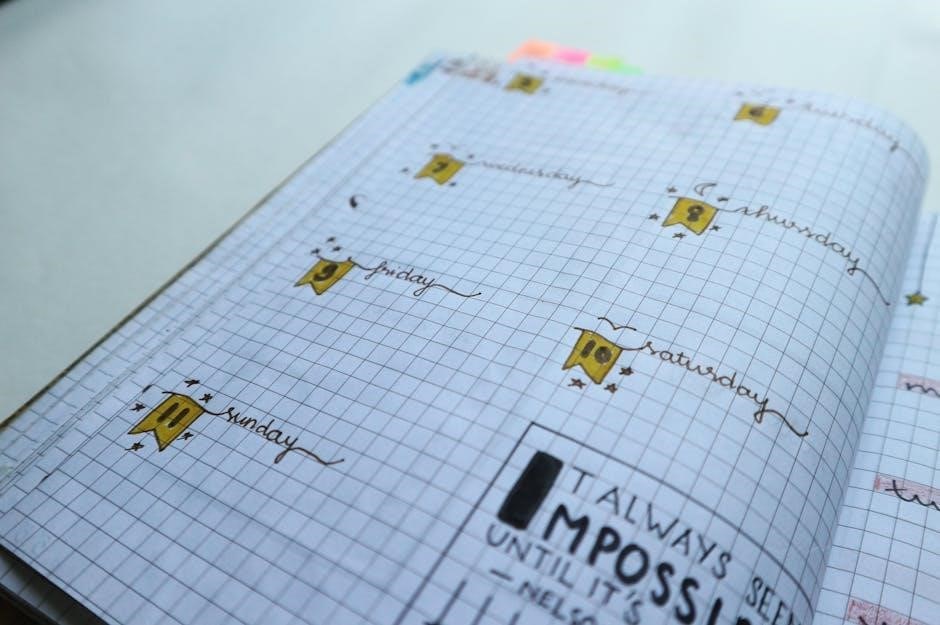
Sample 8-Week-Old Puppy Schedule PDF
A sample schedule provides a structured plan for feeding, potty breaks, play, and sleep. Customize it to suit your puppy’s needs and daily routine effectively.
Structure of a Sample Schedule
A sample 8-week-old puppy schedule PDF typically outlines a daily routine, including feeding times, potty breaks, play sessions, and sleep periods. It may also include time blocks for training, socialization, and veterinary visits. The schedule is often divided into morning, afternoon, and evening sections for clarity. Customizable templates allow owners to adjust timings and activities based on their puppy’s individual needs and lifestyle. This structured approach helps ensure consistency and covers all essential aspects of puppy care.
Customizing the Schedule for Your Puppy
A schedule should be tailored to your puppy’s unique needs, such as feeding times based on their energy levels and play activities suited to their personality. Adjust the routine to fit your lifestyle, like work hours or family dynamics. For example, if your puppy is more active in the mornings, prioritize playtime then. Monitor their responses and tweak the schedule as needed to ensure it remains effective and enjoyable for both you and your puppy.
Downloadable Templates for Puppy Schedules
Downloadable 8-week-old puppy schedule templates offer a convenient way to organize your puppy’s daily routine. These templates typically include sections for feeding times, potty breaks, playtime, and sleep schedules. Many templates are customizable, allowing you to tailor them to your puppy’s specific needs and your lifestyle. You can find these templates online through reputable breeder websites, pet stores, or veterinary resources. They provide a structured yet flexible framework to ensure consistency and make raising your puppy easier and more enjoyable.
A consistent 8-week-old puppy schedule ensures proper development, health, and happiness. Stick to routines, remain patient, and adapt as needed for a well-adjusted, loving companion.
Importance of Consistency in Puppy Schedules
Consistency in an 8-week-old puppy schedule is crucial for establishing routines and expectations. It helps puppies feel secure, aids in training, and prevents behavioral issues. A predictable daily structure ensures proper feeding, potty training, and sleep patterns. Consistency also reduces anxiety and confusion, helping puppies adapt to their environment. By maintaining a regular routine, owners can foster healthy habits and emotional stability, setting the foundation for a well-adjusted adult dog. Sticking to a schedule demonstrates commitment and responsibility, benefiting both the puppy and the family.
Final Tips for Raising a Healthy Puppy
Raising a healthy puppy requires patience, dedication, and attention to detail. Always prioritize positive reinforcement to build trust and confidence. Ensure your puppy receives regular vet checkups and stays on track with vaccinations. Provide a nurturing environment with plenty of love, proper nutrition, and mental stimulation. Keep toxic substances out of reach and supervise playtime to prevent accidents. Stay consistent with training and schedules to promote good habits. By focusing on these key areas, you’ll set your puppy up for a happy, healthy, and well-adjusted life;
